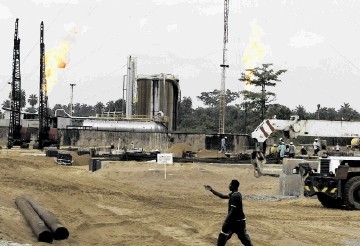
Instability in the Niger Delta has resulted in significant amounts of shut-in production at onshore and shallow offshore fields, forcing companies to frequently declare force majeure on oil shipments.
Since the mid-2000s, Nigeria has experienced increased pipeline vandalism, kidnappings, and militant takeovers of oil facilities in the Niger Delta.
In the past, the Movement for the Emancipation of the Niger Delta (MEND) was one of the main groups attacking or threatening attacks on oil infrastructure for political objectives, claiming to seek a redistribution of oil wealth and greater local control of the oil sector.
Security concerns have led some oil services firms to pull out of the country and oil workers’ unions to threaten strikes over security issues.
The instability in the Niger Delta has also resulted in significant amounts of shut-in production at onshore and shallow offshore fields, forcing companies to frequently declare force majeure on oil shipments.
The amnesty program implemented in 2009 led to fewer attacks and supply disruptions in 2009-10, and companies repaired some of the damaged infrastructure. However, the lack of progress in job creation and economic development has contributed to increased crude oil theft and other attacks in recent years.
Incidents of oil theft and sabotage have increased in 2016. To crack down on corruption, President Buhari announced policies unfavorable to amnesty beneficiaries. Most notably, the amnesty program’s payment process was changed.
The program is now paying recipients directly as opposed to paying the former militant leaders who would then distribute the funds. The amnesty program’s spending is also being cut in an attempt to scale back and gradually phase out the program by the end of 2017.
In addition to the changes made to the amnesty program, President Buhari also discontinued the infrastructure protection contracts in which former militants where in charge of guarding oil and natural gas infrastructure. The ex-militants have been replaced with government security services.
Nigeria’s oil theft and trade business is based on a complex system of networks composed of domestic, regional, and international actors, involving various people—local youth and communities, professionals such as corrupt bank managers, and high-level elites such as government officials and security force personnel.
Oil is stolen at various stages of the production process from upstream to downstream operations—wellheads, manifolds, pipelines, and storage tanks at export terminals. Most oil theft operations typically involve tapping or siphoning oil from a pipeline by a hose and pumping the oil onto barges or small tankers.18
Some stolen crude oil is taken to illegal refineries along the Niger Delta’s swampy bush areas and the refined products are then sold domestically and regionally.
However, the bulk of the crude oil makes its way to international markets. Most of that oil is sold to world markets directly from Nigeria’s export terminals, which is known as white collar theft.
White collar theft entails filling tankers (or topping them off) with stolen oil at export terminals or stealing crude from storage tanks and loading it onto trucks.
A portion of the global illegally traded oil also involves the transfer of crude oil from small tankers to larger tankers waiting further offshore, also known as ship-to-ship transfers.
Estimates of stolen crude oil vary and are as high as 400,000 b/d, but some believe that estimate is too high and may include the volume lost in oil spills.
The volume of crude oil that is stolen is difficult to measure because metering systems are usually at export terminals and, therefore, oil stolen between the wellhead and pipelines is not easily detected.
Furthermore, IOCs do not collectively report volumes stolen, so there is no authoritative source for total stolen volumes.
Asmeret Asghedom is author of the brief for the Energy Information Administration